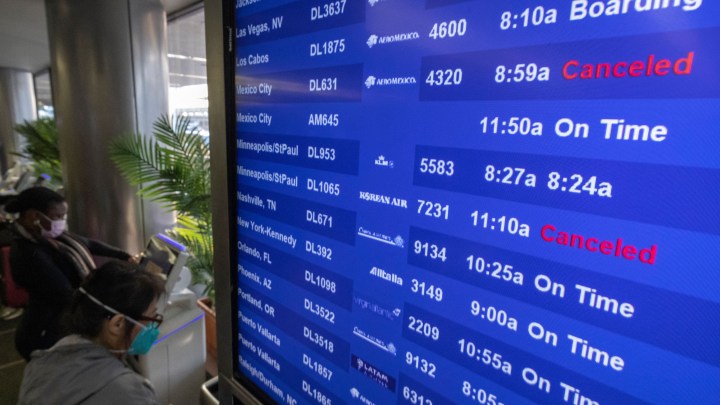
Travel industry uses lessons from past COVID waves to deal with omicron
Travel industry uses lessons from past COVID waves to deal with omicron

We’re hearing a lot of echoes of past COVID waves in the current omicron wave: Businesses are making tough decisions about whether to stay open, ports are having trouble keeping staff levels up (so imported products are backing up) and airlines have had to cancel hundreds of flights.
The travel industry’s been one of the hardest hit by the pandemic. So what has the sector learned from previous waves? And how is it bringing that knowledge to bear as omicron spreads?
Travel agent John Dekker has learned that there’s a lot of demand for what he does. “Since you and I have been talking, my phone’s rang three different times from three different clients.”
Dekker has turned his agency, Surf City Travel in Huntington Beach, California, into a 24/7 operation, solving problems like what to do if a flight’s canceled or a car service doesn’t show up.
“It’s somebody testing positive for COVID trying to get on a flight to come to the United States, and what do they do?” he said.
The travel industry has also learned to be more efficient. For example, hotels are using mobile apps for check-in, according to Dan Wasiolek, a senior equity analyst at Morningstar.
“Hotels are also getting rid of some things such as breakfasts, housekeeping is on a per-request basis,” he said.
Cruise lines are adjusting itineraries on the fly and isolating passengers who test positive, said analyst Henry Harteveldt at Atmosphere Research Group.
He said that airlines are better at rescheduling flights. “An airline is more likely to cancel flights that either are less fully booked or are operating on routes that have more flights scheduled,” he said.
It’s unlikely that airlines will require domestic passengers to take COVID tests or get vaccinated, Harteveldt added. One reason? Airlines will likely look at their unvaccinated customers “and say we don’t want to lop off potentially 14% of our customers and lose 14% of our revenue,” he said.
Harteveldt hopes the travel industry will continue to learn from the latest surge in case other variants emerge in the future.
There’s a lot happening in the world. Through it all, Marketplace is here for you.
You rely on Marketplace to break down the world’s events and tell you how it affects you in a fact-based, approachable way. We rely on your financial support to keep making that possible.
Your donation today powers the independent journalism that you rely on. For just $5/month, you can help sustain Marketplace so we can keep reporting on the things that matter to you.












